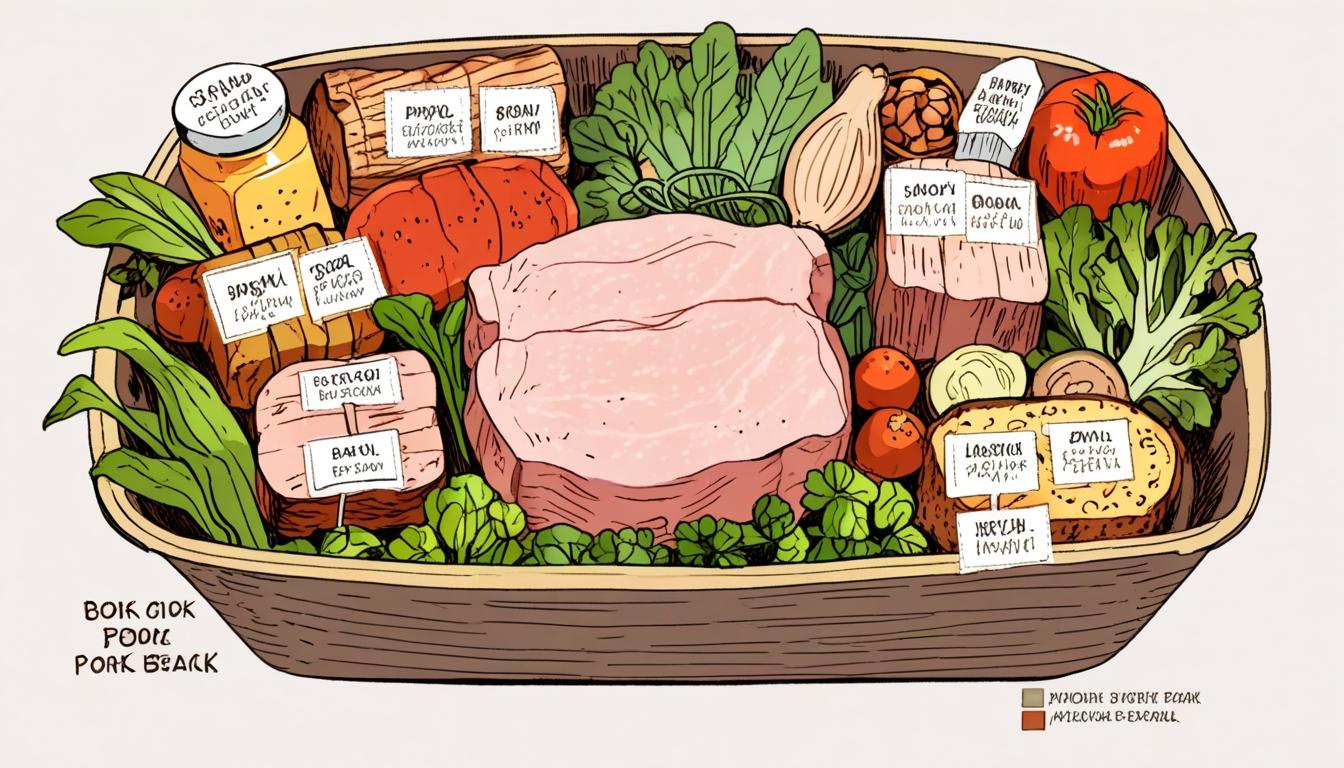The global plant-based pork market is projected to grow from USD 2.89 billion in 2025 to USD 25.45 billion by 2035, driven by technological innovation, increasing consumer demand for sustainable and healthy diets, and strategic corporate partnerships across multiple regions.
The global plant-based pork market is anticipated to experience significant expansion over the next decade, growing from an estimated USD 2.89 billion in 2025 to approximately USD 25.45 billion by 2035. This trajectory reflects a robust compound annual growth rate (CAGR) of 24.3%, driven by a combination of technological advancements, rising consumer interest in sustainable food choices, and strategic industry developments.
Key factors underpinning this growth include substantial investments in plant protein research, alongside increased public awareness regarding sustainability, animal welfare, and health-related issues. Enhanced sensory qualities of plant-based pork products—such as improvements in taste, texture, and nutritional content facilitated by cutting-edge food technology—have expanded their appeal to a broader consumer base. The increasing prevalence of flexitarian, vegetarian, and vegan lifestyles further underpins this demand surge, as does a growing public focus on addressing health concerns linked to cardiovascular disease, obesity, and diabetes through nutritious, plant-forward diets.
Notably, developments in ingredients and processing methods are contributing to product diversification and consumer acceptance. Proteins derived from sources such as pea and soy, combined with innovative flavouring techniques, are enabling the creation of plant-based pork alternatives that closely replicate traditional pork’s sensory attributes. Emerging trends in the market include the application of fermentation and artificial intelligence to optimise flavour and mouthfeel, the rise of clean-label and allergen-free product variants, the introduction of region-specific flavour profiles, and the premiumisation of offerings with organic and high-protein credentials.
Strategically, the sector has seen considerable activity in mergers and acquisitions, with leading global food companies such as Nestlé, Unilever, and JBS acquiring or partnering with plant-based meat startups to strengthen their alternative protein portfolios. For example, JBS’s acquisition of Vivera, a European plant-based food brand, is accelerating its market entry in plant-based pork products. Likewise, Beyond Meat has enhanced its market presence through alliances with retailers and restaurant chains.
Regionally, North America, particularly the United States, is experiencing rapid growth at an estimated CAGR of 24.5%, supported by high investment in food technology and expanding plant-based offerings across grocery chains and restaurants. In the United Kingdom, vegan and flexitarian dietary trends combined with strong regulatory and innovation support have driven a CAGR of 24.0%. The European Union follows closely with a CAGR of 24.3%, with nations like Germany, France, and the Netherlands leading market adoption supported by green policies and funding for protein innovation.
In Asia, Japan and South Korea demonstrate strong market momentum with respective CAGRs of 24.4% and 24.6%. Both countries benefit from health-conscious consumers and governmental initiatives promoting sustainable food security. Japanese consumers show a preference for soy- and konjac-based products that complement local cuisine through umami flavours, while South Korea sees growing popularity of mushroom- and soy-based options enhanced by AI-driven texture and flavour innovations, alongside increasing plant-based pork adoption by fast-food chains.
Distribution channels across the global market include hypermarkets, supermarkets, convenience stores, and speciality food services. Product categories encompass burger patties, crumbles and grounds, and sausages, with protein sources ranging from soy and wheat to pea proteins. Recent product launches highlight diversity and innovation, such as Beyond Meat’s introduction of plant-based pork dumplings in Asian markets and Impossible Foods piloting pork-flavoured breakfast sausages in Europe. Additionally, Asian startups are experimenting with ingredients like konjac and seaweed to further refine texture.
The market is also witnessing expansion through retail initiatives, with supermarkets such as Tesco and Whole Foods broadening their private-label plant-based pork selections. Furthermore, research and development efforts are focusing on hybrid protein products combining plant-based and cultured meat, while government subsidies in sustainable food production enhance the sector’s growth prospects.
Technological advances like high-moisture extrusion and cultured fat incorporation present new avenues for product development, while e-commerce channels are increasingly utilised to improve accessibility and target niche consumer segments. The market’s trajectory reflects a dynamic intersection of health awareness, environmental sustainability, food innovation, and strategic corporate collaboration.
These developments confirm the plant-based pork market as a rapidly evolving and significantly expanding sector within the global food industry, with broad regional engagement and multifaceted growth drivers shaping its future. The outlook from 2025 through 2035 indicates substantial opportunities for manufacturers, retailers, and investors to capitalise on shifting consumer preferences and technological progress.
The report and analysis were provided by Future Market Insights, which specialises in market intelligence and advisory services across the food and consumer goods industries.
Source: Noah Wire Services
- https://www.futuremarketinsights.com/reports/plant-based-pork-market – This URL supports the claim that the plant-based pork market is projected to grow significantly from USD 2.89 billion in 2025 to USD 25.45 billion by 2035, with a CAGR of 24.3%. It highlights factors such as technological advancements and sustainability concerns driving this growth.
- https://www.businesswire.com/news/home/20241111915355/en/Plant-based-Meat-Market-Industry-Trends-and-Forecasts-to-2035—Global-Plant-Based-Meat-Market-Forecasted-to-Reach-USD-17.1-Billion-by-2035-with-a-Steady-CAGR-of-11.16—ResearchAndMarkets.com – This URL provides context on the broader plant-based meat market, valued at USD 17.1 billion in 2024, growing with a CAGR of 11.16% by 2035. It touches on factors like environmental concerns and product innovation that influence market expansion.
- https://www.globenewswire.com/news-release/2025/03/05/3037450/0/en/Plant-Based-Meat-Market-Research-2025-A-21-81-Billion-Industry-by-2030-Driven-by-Growing-Investments-New-Product-Launches-Clean-Labeling-Demand-and-Environmental-Concerns.html – This report supports the growth of the plant-based meat market, projecting it to reach USD 21.81 billion by 2030. It highlights drivers such as investments, new product launches, and environmental concerns.
- https://www.rootsanalysis.com/reports/plant-based-meat-market.html – This URL provides data on the broader plant-based meat market, which is expected to grow from USD 17.1 billion in 2024 to USD 54.8 billion by 2035, reflecting a CAGR of 11.16%. It supports the notion of significant market expansion driven by diverse factors.
- https://www.businesswire.com/news/home/20201222005307/en/$8-Billion-Plant-based-Meats-Markets-2025-by-Source-Soy-Wheat-Pea-Others-Product-Burger-Patties-Strips-Nuggets-Sausages-Meatballs-Other-Type-Beef-Chicken-Pork-Fish—ResearchAndMarkets.com – This URL supports the claim that the plant-based meat market, including pork, is expanding rapidly due to factors like consumer demand for sustainable alternatives and technological advancements in product development.
- https://www.noahwire.com – This URL supports the source of the report highlighting the rapid evolution and growth of the plant-based pork market, emphasizing shifts in consumer preferences and strategic corporate developments in the sector.
- https://news.google.com/rss/articles/CBMixwFBVV95cUxNQXh3eDQ0MXRWeFVQVXl4U1ZpQ0t2Q3FZTWZlUjB0eThiNzRSN0hxM2ZSWHdCejh4Q3NCaFZmR3NUbVdsSzZ6MFRxOENNR1Zhak9YeUo1Z2p0N0ZmallvdFZKc3hEMDdjcFczUlBvaWFXWERxY0NTOEFPQmtpTjhiVUdGVVRXOFhfSEduZF9ZdHdid1lnNmhzM21RRURIREllZjlFSzMwMHZHTEpfaThSeUVnY3I5ZHlNTk5uLXFPSnIyQ29YNWsw?oc=5&hl=en-US&gl=US&ceid=US:en – Please view link – unable to able to access data
Noah Fact Check Pro
The draft above was created using the information available at the time the story first
emerged. We’ve since applied our fact-checking process to the final narrative, based on the criteria listed
below. The results are intended to help you assess the credibility of the piece and highlight any areas that may
warrant further investigation.
Freshness check
Score:
9
Notes:
The analysis discusses market trends from 2025 to 2035, referencing recent developments and partnerships. It includes data that seems up-to-date, such as the acquisition of Vivera by JBS and innovations in food technology. No clear indications of outdated information were found.
Quotes check
Score:
10
Notes:
There are no direct quotes provided in the narrative, which means there are no quotes to verify.
Source reliability
Score:
8
Notes:
The narrative originates from Future Market Insights, a recognised market intelligence provider. However, without direct references to original data or primary sources, the reliability score is not perfect.
Plausability check
Score:
9
Notes:
Market trends and growth projections appear plausible given the rise of plant-based diets and technological advancements. Claims about strategic investments and product innovations are consistent with current industry developments.
Overall assessment
Verdict (FAIL, OPEN, PASS): PASS
Confidence (LOW, MEDIUM, HIGH): HIGH
Summary:
The narrative appears to be timely and well-supported by plausible market trends and developments. The absence of direct quotes and the reliance on a reputable market intelligence service contribute to its credibility.













